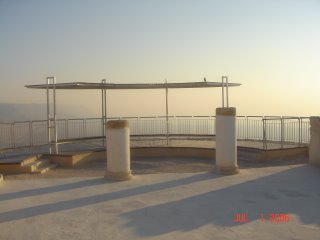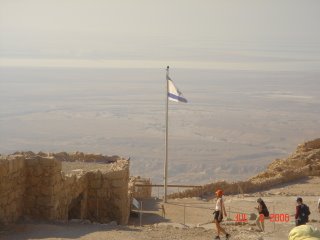Today was Masada. To anyone who had heard the phrase "snake path," that is all that needs to be said.
For the uninitiated, climbing Masada is the practical equivalent of going to the gym when you really don't want to, but feeling really good and proud of yourself afterward. Times ten thousand. On both ends.
Masada was a city-fortress atop a mountain created by King Herod. In 70 B.C.E., a small group of religious zealots took refuge there after the Romans destroyed the Second Temple. After two years of trying, the Romans seized the fortress by building a ramp to the top on the back of the mountain.
As the Romans breached the defenses, the Jews at Masada made a decision that distinguished them from many other Jews. They decided that, rather than suffer the imminent torture of humiliation of Roman punishment and slavery, they would engage in a mass suicide, dying free.
The 45-minute (45. Yeah. Right.) climb up Masada was bright and early, in order to avoid in the intense summer desert heat.
Climbing Masada is like using a stairmaster. A stairmaster on steroids. Lots of steroids. When you're asleep.
Seriously.
But the physical pain of climbing the mountain is nothing compared to the perplexing questions that confront you at the top.
Masada is more than a national landmark. It is part of the Jewish zeitgeist. The idea of Jews killing themselves rather than facing slavery and humiliation is incredibly romantic to the Jewish community.
But is it really a sign of strength?
One fact brings this issue to the forefront for me: There are no descendents of the Jews of Masada.
Consider the possibility that Jews of the Holocaust simply committed mass suicide rather than suffer the unspeakable atrocities of the concentration and death camps. While some did, the majority did not. And it is the children and children's children of the survivors, those who relied on hope and faith rather than pride and glory, who make up the world's Jewish communities today.
So who is stronger, the person who bears the torture and humiliation in the hope of survival or the person who kills himself, and his yet to be born descendants, to preserve the dignity of avoiding it?
And doesn't a Jew who kills himself complete the goal for the anti-Semite by expediting his work?
Isn't living the real act of resistance?
And if so, aren't the survivors the real martyrs?
If this is the case---if the attempt to live is more honorable than the act of death by one's own hand to avoid humiliation and servitude---then why is Masada a source of pride? Why is Masada so highly revered? Why do entire families go to the top of the mountain to have their bar mitzvot in the ruins of the Masada synagogue? Why did I feel such a connection to the past when I prayed in that same synagogue? Why should we revere those who contradicted not only Jewish law, but the principal Jewish value---any law can be broken to save a life?
And yet we do. We sing songs of our pride in Masada. We tell the story as one of resistance and sacrifice, not one of shame.
Yeah.
With questions like these, that climb seems pretty easy.
Masada from the ground (admittedly a little blurry)...

A model of Herod's Northern Palace...

The view from where it stood today...

Davening morning prayers at the synagogue atop Masada...

The ramp built by the Romans to breach Masada. You can see the Roman encampments at the top and the top right...

A model of the bathhouses...

The bathhouse ruins...


The false floors of the bathhouses...

The Israeli flag, flying atop Masada, as a symbol that it will never again be conquered...




2 comments:
Thanks Neil. I'm glad you're enjoying!
Thanks Kevin!
It's not just a blog, it's a public service. ;)
Post a Comment